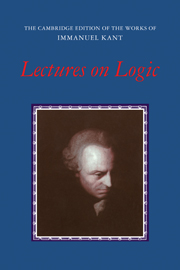Book contents
- Frontmatter
- Contents
- General editors' preface
- Acknowledgments
- Translator's introduction
- PART I The Blomberg logic
- PART II
- PART III The Dohna-Wundlacken logic
- PART IV The Jäsche logic
- Preface
- Introduction
- I Universal doctrine of elements
- II Universal doctrine of method
- PART V Appendixes
- Explanatory notes
- Name index
- Subject index
I - Universal doctrine of elements
Published online by Cambridge University Press: 05 June 2012
- Frontmatter
- Contents
- General editors' preface
- Acknowledgments
- Translator's introduction
- PART I The Blomberg logic
- PART II
- PART III The Dohna-Wundlacken logic
- PART IV The Jäsche logic
- Preface
- Introduction
- I Universal doctrine of elements
- II Universal doctrine of method
- PART V Appendixes
- Explanatory notes
- Name index
- Subject index
Summary
FIRST SECTION
Of concepts
The concept in general and its distinction from intuition
All cognitions, that is, all representations related with consciousness to an object, are either intuitions or concepts. An intuition is a singular representation (repraesentatio singularis), a concept a universal (repraesentatio per notas communes) or reflected representation (repraesentatio discursiva).
Cognition through concepts is called thought (cognitio discursivd).
Note 1. A concept is opposed to intuition, for it is a universal representation, or a representation of what is common to several objects, hence a representation insofar as it can be contained in various ones.
2. It is a mere tautology to speak of universal or common concepts – a mistake that is grounded in an incorrect division of concepts into universal, particular, and singular. Concepts themselves cannot be so divided, but only their use.
Matter and form of concepts
With every concept we are to distinguish matter and form. The matter of concepts is the object, their form universality.
Empirical and pure concept
A concept is either an empirical or a pure concept (vel empiricus vel intellectualis). A pure concept is one that is not abstracted from experience but arises rather from the understanding even as to content.
An idea is a concept of reason whose object simply cannot be met with in experience.
- Type
- Chapter
- Information
- Lectures on Logic , pp. 589 - 629Publisher: Cambridge University PressPrint publication year: 1992



